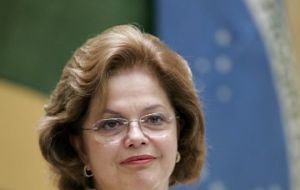MercoPress. South Atlantic News Agency
Brazil satisfied with measures to cut ‘torrential inflow’ of US dollars
 The administration of President Dilma Rousseff is adopting a stronger position on capital controls
The administration of President Dilma Rousseff is adopting a stronger position on capital controls Brazil’s Finance Minister Guido Mantega said dollar inflows into the country have returned to a “reasonable” level, after the government took steps to stem a flood of foreign money.
“In March, we had a torrent of dollars” Mantega said in an interview Tuesday with Globo News television. “We took tough measures, the IOF tax, and we succeeded in stemming the flow. In May it returned to a reasonable level.”
Brazilian President DilmaRousseff’s administration on March 29 increased to 6% a tax on new corporate loans and debt sales abroad by banks. A few days later, Rousseff applied the higher tax to renewed, renegotiated, or transferred loans of up to two years in length. Companies previously paid a 5.38% tax on loans up to 90 days and zero tax when the operation exceeded three months. In October, Mantega tripled to 6% a tax on foreign investors’ fixed-income purchases.
Brazilian inflation is being stoked by the country’s tight labour market, and the service sector, Mantega said. Emerging markets with heated economies, such as Brazil, India and China, risk inflation from commodity price inflation spreading to other areas, Mantega said.
Annual consumer price inflation breached the upper limit of its target range in April, accelerating to 6.51%, the fastest pace since 2005.
Central bank President Alexandre Tombini raised the benchmark Selic by 25 basis points to 12% on April 20 after 50 basis-point increases in January and March. The central bank targets inflation of 4.5%, plus or minus two percentage points.
Brazil is trying to cool the economy, without slowing growth too much, Mantega said.
“We want to throw water on the fire, without putting it out,” Mantega said. “We want the economy to keep growing.” The country’s high interest rate is necessary for the time being, Mantega said.
Brazil’s unemployment rate reached a record low of 5.7% in December before rising to 6.5% in March, the lowest ever for that month. But the economy added 272,225 registered jobs in April, the second- fastest pace in almost a year, the Labour Ministry reported this week.
Mantega revealed that the government will seek to cut to payroll taxes that firms pay, to help businesses remain competitive and also has plans to cut the state sales taxes. Some of these proposals will be made public in June.




Top Comments
Disclaimer & comment rules-

-

-

Read all commentsDidn't you late ?
May 18th, 2011 - 07:04 pm 02008 / Stocks in Bovespa = 75 billions us$
2011 / Stocks in Bovespa = 260 billions us$
------------------------------------------------------
2008 / Fixed income derivatives = 120 billions us$
2011 / Fixed Income derivatives = 400 billions us$
------------------------------------------------------
2008 / Foreign direct investments = 50 billions us$
2011 / Foreign direct investments = 60 billions us$
are you deep sleeping ?
Yul,
May 19th, 2011 - 09:43 pm 0if you can better explain your point,
I will have a chance of understanding it.
Geoff.
lol !!
May 20th, 2011 - 11:17 pm 0Commenting for this story is now closed.
If you have a Facebook account, become a fan and comment on our Facebook Page!